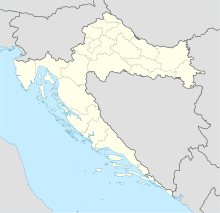| Action of 29 November 1811 | |||||||
|---|---|---|---|---|---|---|---|
| Part of the Napoleonic Wars | |||||||
 La Pomone contre les frégates HMS Alceste et Active, Pierre Julien Gilbert | |||||||
| |||||||
| Belligerents | |||||||
|
|
| ||||||
| Commanders and leaders | |||||||
|
|
| ||||||
| Strength | |||||||
|
3 frigates 1 sloop |
2 frigates 1 armed storeship | ||||||
| Casualties and losses | |||||||
| 61 killed and wounded |
100 killed and wounded 300 captured 1 frigate captured 1 armed storeship captured[1] | ||||||
Location of the battle shown on a map of modern-day Croatia | |||||||
The action of 29 November 1811 was a minor naval engagement fought between two frigate squadrons in the Adriatic Sea during the Adriatic campaign of the Napoleonic Wars. The action was one of a series of operations conducted by the British Royal Navy and the French Navy to contest dominance over the Adriatic between 1807 and 1814. During this period the Adriatic was surrounded by French territory or French client states and as a result British interference was highly disruptive to the movement of French troops and supplies.
The action came over eight months after the British had achieved a decisive victory over the French at the Battle of Lissa and was the first squadron action since that engagement. The action of November 1811 was the result of the British interception of a French military convoy traveling from Corfu to Trieste with a consignment of cannon, and resulted in a British victory, only one French ship escaping capture by the British force. It has been suggested that this action was a factor in Napoleon's decision to change the direction of his planned eastwards expansion in 1812 from the Balkans to Russia.
- ^ James, p. 378
